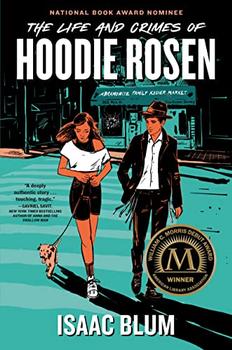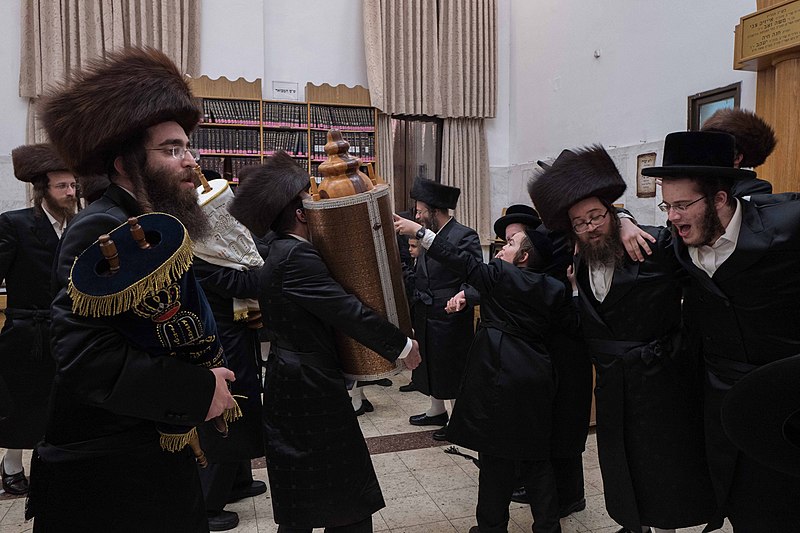Summary | Excerpt | Reviews | Beyond the Book | Read-Alikes | Genres & Themes | Author Bio

This article relates to The Life and Crimes of Hoodie Rosen
 Human connections are arguably at their most powerful when experienced through communal dance, music and other communication beyond words. Events such as these are highlighted numerous times in Isaac Blum's debut young adult novel, The Life and Crimes of Hoodie Rosen, which creates a picture of Orthodox Jewish life that sears into one's mind. Nowhere does the power of collective tradition resonate more than in the book's depiction of the festive holiday Simchat Torah.
Human connections are arguably at their most powerful when experienced through communal dance, music and other communication beyond words. Events such as these are highlighted numerous times in Isaac Blum's debut young adult novel, The Life and Crimes of Hoodie Rosen, which creates a picture of Orthodox Jewish life that sears into one's mind. Nowhere does the power of collective tradition resonate more than in the book's depiction of the festive holiday Simchat Torah.
Literature lovers may be pleased to know that Religious Studies Professor Samuel L. Boyd likens the feelings present in the holiday to the process of completing a book: "Reading can cause many different emotions. For some people, beginning a new book produces excitement about where the narrative will take them. Then there's the pleasure of the plot itself, watching how events unfold. Finally, there's the sense of joy at the end: satisfaction, gratitude and anticipation at the prospect of beginning the journey of reading all over again."
Reading itself is in fact central to Simchat Torah, when Jews commemorate another yearlong cycle of reading the Torah — the first five books of the Hebrew Bible (Genesis, Exodus, Leviticus, Numbers and Deuteronomy) — in a celebration that, according to Boyd, "cultivates a sense of humility and resilience in the midst of profound joy."
Simchat Torah takes place in October, following the day of Shemini Atzeret (falling at the end of the weeklong celebration of Sukkot), on which a memorial for the departed is shared. On Simchat Torah, the Torah scrolls in a congregation are taken from the ark (the traditional receptacle where they are kept) and carried through the synagogue in a procession. This is one of the few times of the year that the scrolls are all removed from the ark.
During the procession, participants circle seven (or sometimes three) times around the bimah, the stage where the scrolls are read. This parade is a joyous one, usually accompanied by singing and dancing, and with children being given sweets. Some feel that they actually become the "feet" of the scrolls that they carry, embodying a sacred connection that is duplicated across generations. The final section of Deuteronomy and the first section of Genesis are read within the same service, thereby connecting the last cycle to the beginning of a new one.
In The Life and Crimes of Hoodie Rosen, the young characters grapple with how traditions such as Simchat Torah are easily eroded by the globalization of our society today. At one point, the main character Hoodie, who longs to explore more of the outside world beyond his community, asks his friend, Moshe, if he ever gets tired of the traditional, old-fashioned nature of their faith. Moshe admits the restrictions and responsibility can feel daunting. But then he proclaims how they give his life meaning, saying, "when you dance with God's Torah in your hands, when you celebrate with all of your people, with every Jew, holding God's words to Moses on Sinai in your hands…there is no burden I wouldn't take on in exchange for that feeling."
This sense of belonging, of confidence in one's identity and place in the world, is one most human beings long for. While The Life and Crimes of Hoodie Rosen explores the sometimes tragic consequences of religious conformity and rigid conventions, it also explores how traditions such as Simchat Torah are occasions when people can come together and feel empowered.
A Simchat Torah celebration in 2017, courtesy of Gady Munz Pikiwiki Israel (CC BY 2.5)
Filed under Places, Cultures & Identities
![]() This "beyond the book article" relates to The Life and Crimes of Hoodie Rosen. It originally ran in November 2022 and has been updated for the
October 2023 paperback edition.
Go to magazine.
This "beyond the book article" relates to The Life and Crimes of Hoodie Rosen. It originally ran in November 2022 and has been updated for the
October 2023 paperback edition.
Go to magazine.
These are not books, lumps of lifeless paper, but minds alive on the shelves
Click Here to find out who said this, as well as discovering other famous literary quotes!
Your guide toexceptional books
BookBrowse seeks out and recommends the best in contemporary fiction and nonfiction—books that not only engage and entertain but also deepen our understanding of ourselves and the world around us.